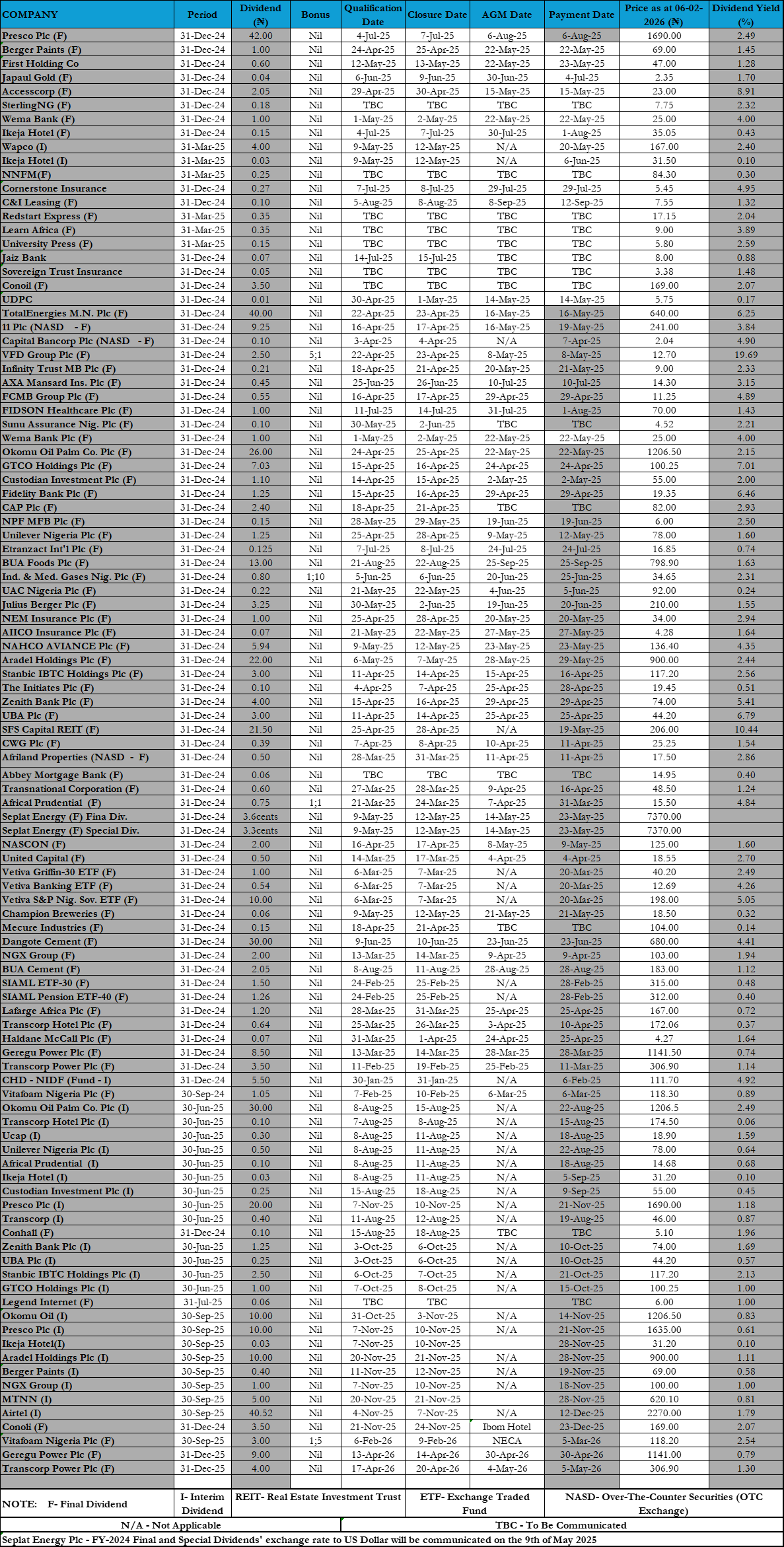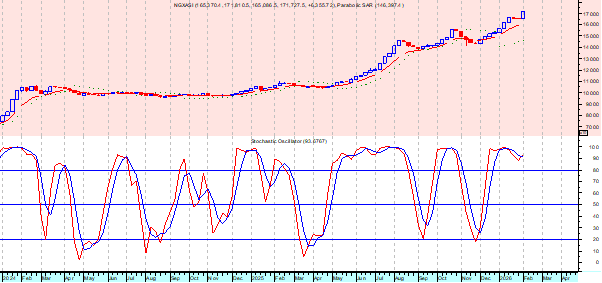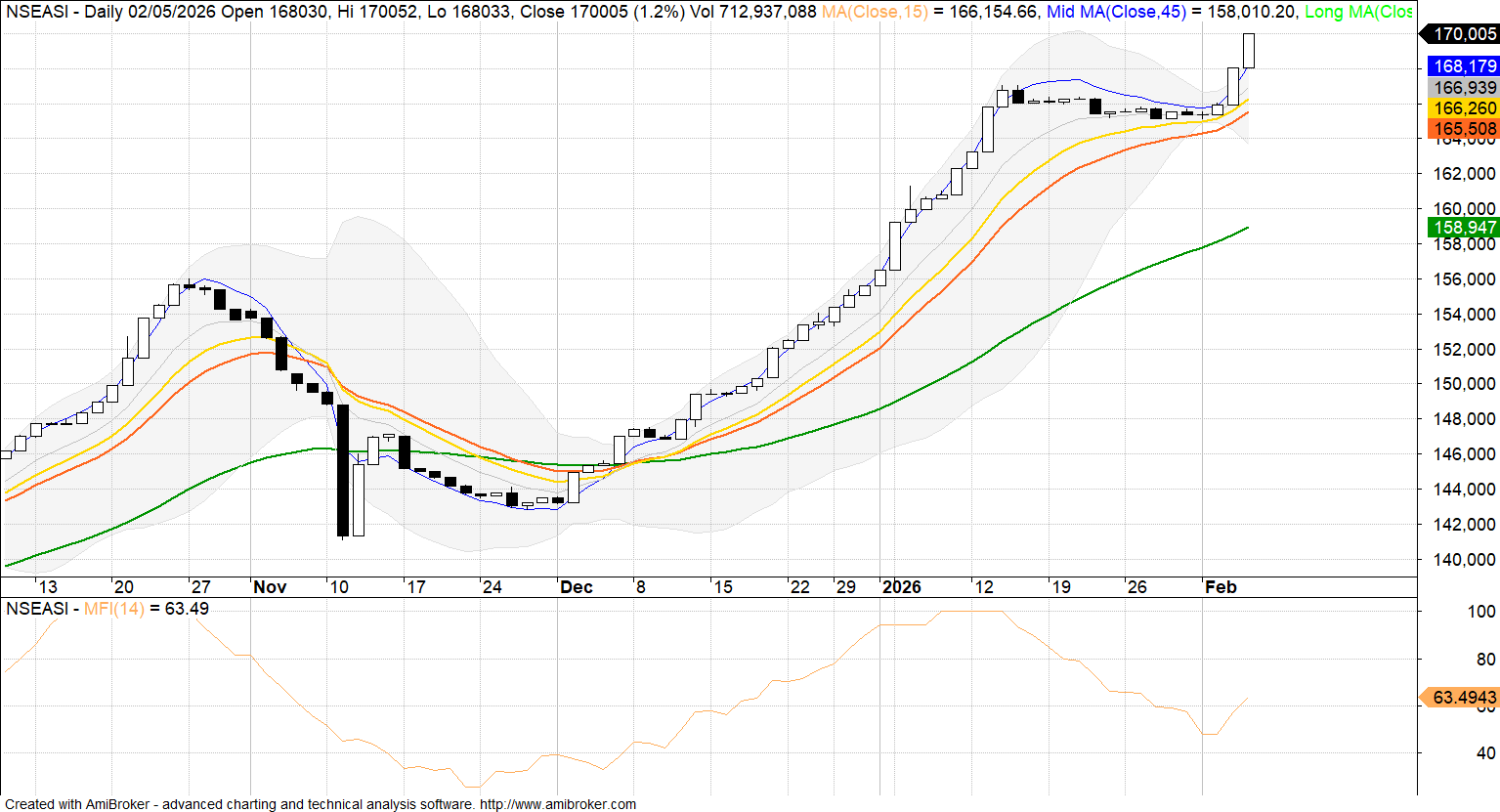
Mid-year Market Roundup
Nigeria’s stock market closed lower the first half of the year 2019 lower, despite the last seeming rebound in the last trading days of June closing as bargain hunters repositioned their portfolios for the end of quarter window dressing. It was also due to trading account balancing, especially by fund managers ahead of the expected Q2 earnings reporting season and second half economic dynamics.
The continuing slide in investor confidence in the nation’s economy and weak market fundamentals have also reflected in the performance pattern before and after the 2019 general elections. This has not been helped by the leadership style of President Muhammadu Buhari and made worse by the delay in constituting a cabinet one month after the inauguration of his government for the second term of four years and four months since the presidential election in February. The wait-and-see attitude is however not unexpected, given that the lack of economic direction, weakening indices in the face of rising insecurity and unfriendly business environment with policy summersaults by the government and its agencies which continue to hinder effective recovery.
The post-2019 election political environment which is weighing in on the nation’s stock prices, many of which have hit their 52-week low, despite the resistance in May due to the artificial rally triggered by the listing by introduction of MTN Nigeria, following which the month of May became the second to close positive. This was after the February price rally as smart money took last-minute position ahead of the presidential election, amidst safe bet on the outcome. They however exited immediately results of the poll went against their expectations.
The weak corporate earnings for 2018 full year and Q1 2019 resulting from the slow economic activities also was a major factor that affected domestic and international investor confidence as economic activities continued to decline in the first two quarters of 2019. Even then, the decision of the Monetary Policy Committee (MPC) of the Central Bank of Nigeria (CBN) to cut the benchmark Monetary Policy Rate (MPR) by 0.5% from 14% in Q1 has not yielded the desired result, as the economy is yet to feel the impact at a time borrowing costs remain high with banks preferring to invest their funds in government securities with juicy returns. Also, the Purchasing Managers’ Index (PMI) has continued to slow down, while inflation is on the upswing, rising to 11.40% in May, just as crude oil price and the nation external reserve continue to fluctuate.
The benchmark Nigerian Stock Exchange (NSE) All-Share index (ASI) in the first half the year lost all of 1,463.63 basis points, closing at 29,966.87 basis points from its 31,430.50bps opening figure, representing a 4.66% decline. Within the period, however, it touched a high of 32,958.96bps and low of 28,019.97bps.
Trading activities for the half year started on a negative note in January which was characterized by volatility and mixed sentiment as selling pressure dominated the period, after the share prices of blue chips stocks suffered losses. The mixed performance experienced in Q1 was extended to the second quarter as the bear market lingered into April and June.
NSE MONTHLY INDEX MOVEMENT FOR FIRST HALF OF 2019
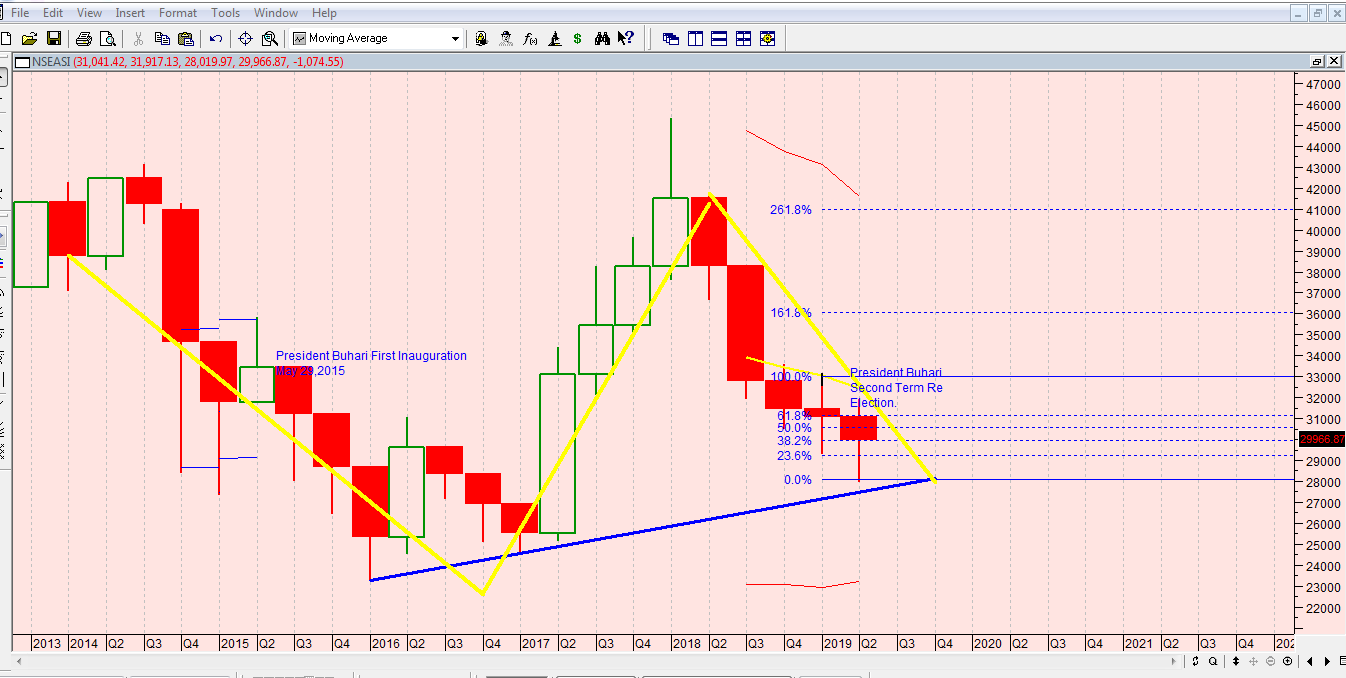
Looking back at the timeline, the tops and bottoms in the V-shaped yellow line move on the chart above all align perfectly with the narrative of unstable economic performance and lack of coordination between the fiscal and monetary authorities.
The five consecutive quarters downtrend by the market has caused many to lose their money but at the current prices of stocks, but we expect changes in the market and economic dynamics going into the second half of the year. Investors should, therefore, start repositioning for the rest of the year and beyond.
The market’s sectoral indices performance for the period was bearish, except for the NSE Premium Index that closed higher, chalking 9.17%, due to the listing of MTN Nigeria in the index. The NSE Consumer Goods and Oil/Gas indices led the decliners by 16.89% and 16.21% respectively.
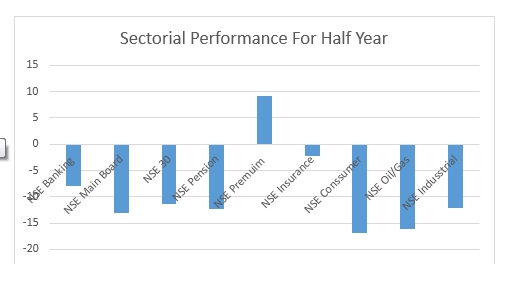
The negative performance of the sectoral indices reflected, among others, in the weakening purchasing power of Nigerians, besides the low consumer confidence, just as the labour market remained weak with unemployment rate above 60%. Corporate earnings from the sector were below market expectation and mixed within the period under consideration. Others indexes performance were revealed by the chart above.
The prevailing low liquidity in the market was visible given available data showing the continued exit of foreign and institutional players. This also revealed how very dependent Nigeria’s stock market and economy have dependent on foreign funds, that tend to dictate economic prosperity and wealth creation by their movement in and out of the market at any time. Knowing the danger of foreign investor dominance in any stock market, local investors and traders should plan their trades for the rest of the year in case they return after the Q2 numbers and clear economic reform policies are articulated by the expected cabinet.
Year-To-Date Return
Despite the gloomy state of the market, low cap stocks dominated the best-performing stocks in terms of capital gain for the period under consideration.
A total of 27 stocks closed higher, with 14 of them appreciating in value above 10%. The top five best-performing stocks were: C & I Leasing with 214.61%; Dangote Flour Mills had 165.15%; while Thomas Watt, Chams and Caverton recorded capital growth of 82.61%, 45% and 33.85% respectively.
A further breakdown showed that the services stocks dominated the table of best-performing stocks for the first half of the year, a situation that may likely continue in the second half with other stocks that had suffered losses within the period, rebounding on low price attraction ahead of the Q3 earnings season and year-end seasonality rally depending on economic direction.
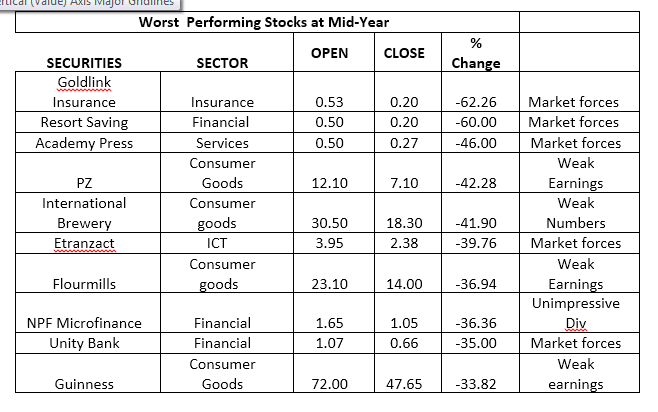
At the end of the first half of year, more than 82 stocks were on the worst performing table, dominated by medium cap and blue-chip stocks that had suffered losses due to prolonged down market and dwindling earnings power. Others on the table were the kobo stocks that had posted mixed and negative earnings.
The top 10 worst performing stocks for the period were: Goldlink Insurance, which lost 62.26% of its opening price; Resort Saving & loan, 60%; while Academy Press, PZ and International Brewery lost 46%, 42.28% and 41.90% respectively. See the table below.
Attention: If you haven’t signed up for Investdata buy and sell signal setup, don’t delay. We have just added another risk management feature and new favorite stocks of the most revered traders and investors in corporate Nigeria to our watchlist, these stocks are with double potentials. To become a member, send ‘YES’ or ‘STOCKS’ to the phone numbers below. Take advantage of this service to buy right and sell right during this portfolio reshuffling and repositioning ahead of Q2 numbers and fiscal stimulus.
Take Action
The difference between you and others who are not aware of what I am sharing with you is ACTION. Take action that will transform your life throughout 2019 and beyond by getting the just concluded and life-transforming INVEST 2019 TRADERS & INVESTORS SUCCESS SUMMIT, CHART SUMMIT, and POST ELECTION BULLS & BEARS Home study pack (USB) that you can play on your phone, Laptop and Television set.
The events were a successful, insightful and educative outing that not only offered direction as to where investors should look for profitable trade in 2019 and beyond, insight into industries, sectors, and companies to seek worthwhile returns. What stocks should you buy? Grab the pack for the 10 Golden Stocks with the possibility of offering in 2019 multiples of what broader stocks do, coming out of this market correction environment.
Don’t sit on the Fence call or text Stock to 08028164085, 08032055467, 08111811223 now.
Ambrose Omordion
CRO|Investdata Consulting Ltd
info@investdataonline.com
info@investdata.com.ng
ambrose.o@investdataonline.com
ambroseconsultants@yahoo.com
Tel: 08028164085, 08032055467








